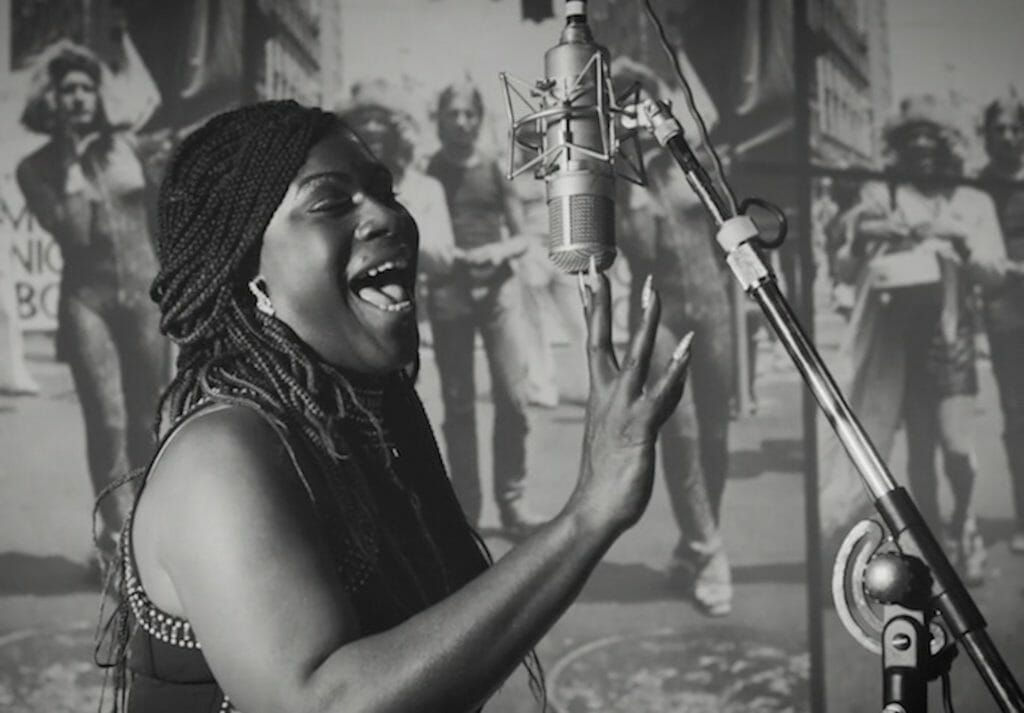The singer talks about running away from home at 14, writing music in prison, and challenges cis singers to elevate trans people in their music.
Shea Diamond’s career still feels like a joke to her, that it all could be taken away at any moment. “And I know that sounds horrible, but I just don’t feel like we’re respected as human beings, so how can we be respected in art?” She says on this week’s episode of LGBTQ&A.
The 42-year-old soul singer grew up on a dirt road in Little Rock, Ark., ran away from home at 14, and spent 10 years in prison where she ultimately penned the new trans anthem, “I Am Her.” Now Diamond’s signed by a major record label; her recent EP, Seen It All, was executive produced and co-written with Justin Tranter, one of the most sought after names in pop. “I’m walking the red carpets now. That’s not something that was meant for me. I’m too dark, too trans, too fat, too old. All these things translate to, ‘You’re done.'”
Read highlights of her interview on LGBTQ&A below and click here to listen to the full interview.
Shea Diamond talks about an early experience with thoughts of suicide.
“You’ve got to understand my experience before I got incarcerated. You’ve got to understand, nobody wants a trans child. I was a trans child. Nobody wants a trans child. And this is not to demonize my parents. It’s not. Because we don’t know the things that we know now.
A lot of us killed ourselves because of the experience that we had in our households. And I was one of the ones who was going to. I was going to. At 14-years-old, I was going to end my life. I was not going to write “I Am Her,” to live the tale, to say that. But I had to be stronger than all the doubt I had in my heart and my mind. I had to be stronger than all the ridicule, all the harassment, all the neglect that happened in my life.”
Shea Diamond says nothing has changed since the days of Marsha and Sylvia.
“Nothing has changed since the days of Sylvia and Marsha. Nothing has changed. When you go into our bars…again, we don’t have trans bars. We just have gay bars. Do you think the gays are going to offer their seats to an elderly trans woman that comes in there that’s disabled? No. We don’t protect each other like we used to. Now we’re attacking each other. Society’s pitting us against each other. If we say, “Okay, there’s going to be a trans artist. It’s going to her.” Then there’s no room for no other trans artists.”
Shea Diamond says trans people are denied the ability to dream.
“We’ve lost the ability to dream because people have taken that away from us. They’ve told us that because we’re queer, because we’re black, because we’re trans, because we’re gay, because we’re fat, that we can’t obtain this dream. And so that’s been embedded in our minds.
I had a dream since I was small and I was told I could not access that dream because, first of all, I wasn’t a girl. Society gave me my script and told me, “Oh, no, you’re not a girl. Honey, you came into this world, this is who you are.” And I refuse to go by their script. I thought outside the box. I thought, “Why not color outside the lines? Make it look cute.”
I want society to adjust to that change. Get out of the caveman way of thinking. Trans people are who they say they are, not who you want them to be.”
Shea Diamond challenges singers to make music with trans people.
“I believe if people really stood for change in this climate, that a cis woman would say, “Yes, I want to do a duet with one of those trans women.” It doesn’t have to be Shea Diamond. It can be any trans woman.”
It’s still hard for Shea Diamond to fully trust her success.
“I just don’t feel like we’re respected as human beings, so how can we be respected in art? It has to be, maybe they’re ridiculing me. Maybe I’m the butt of the jokes. Maybe reality is going to smack us back in the face.
My music is me. My music is not pretending to be somebody else. My music speaks about oppression. It doesn’t speak about how to pop your booty. It speaks about how times should change. It speaks about how we should center ourselves, self-care. If we don’t have self-care in ourselves, how can we care for anybody else? It’s time to tear down this system of oppression, the marginalized. It’s talking about survival sex workers. It’s talking about stuff that people aren’t able to comprehend. They don’t want to think about these things. Why are we trying to project that anybody is normal? Nobody is normal.”
Click here to listen to the full interview with Shea Diamond.
LGBTQ&A is hosted by Jeffrey Masters and produced by The Advocate magazine, in partnership with GLAAD. Past guests include Laverne Cox, Pete Buttigieg, and Roxane Gay.













